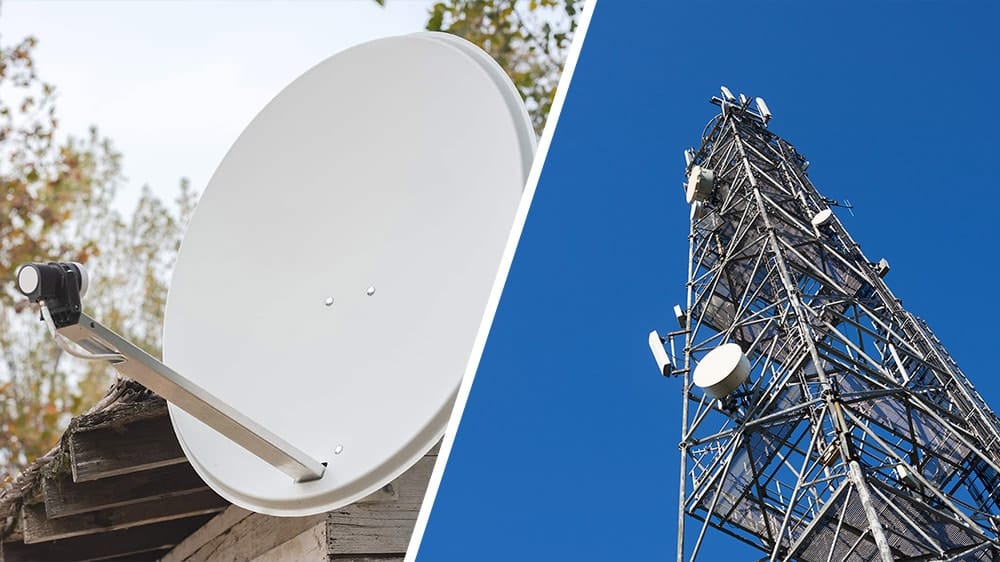
Choosing the right internet service is crucial, especially in rural areas where options may be limited. Satellite and fixed wireless internet are two popular choices, but they operate differently and offer distinct advantages. Understanding these differences can help you select the best option for your needs.
Understanding Satellite Internet
Satellite internet uses satellites orbiting the Earth to provide internet access to users on the ground.
How Satellite Internet Works
- Data Transmission: Signals are sent from your satellite dish to a satellite in geostationary orbit (about 22,000 miles above Earth) and then back to a network operations center before reaching the internet.
- Equipment Needed: A satellite dish installed at your location and a modem inside your home.
Satellite systems are particularly useful in remote areas, offering communication services where traditional infrastructure is lacking.
Benefits of Satellite Internet
- Wide Availability: Accessible virtually anywhere with a clear view of the sky.
- Independence from Ground Infrastructure: Ideal for areas without cable or fiber networks.
Considerations
- High Latency: The long distance that satellite signals must travel causes delays, affecting activities like online gaming or video calls.
- Weather Sensitivity: Performance can be affected by heavy rain or snow.
- Data Caps: Many satellite plans have limits on data usage.
Understanding Fixed Wireless Internet
Fixed wireless internet delivers broadband service through radio signals from ground-based towers to receivers installed at your location.
How Fixed Wireless Internet Works
- Data Transmission: Uses radio waves to send data between a ground station and your home antenna.
- Line of Sight: Requires a clear path between the tower and your receiver, usually within 10 miles.
Fixed wireless provides robust communication services to users in rural and more remote regions, enhancing connectivity without extensive infrastructure.
Benefits of Fixed Wireless Internet
- Lower Latency: Shorter distances reduce delays, improving performance.
- High Speeds: Comparable to DSL or cable, suitable for light streaming and gaming.
- Quick Installation: No need for extensive infrastructure like cables or satellites.
Considerations
- Line of Sight Requirement: Obstructions like trees or buildings can affect signal quality.
- Availability: Service depends on proximity to a provider’s tower.
Learn How Fixed Wireless Internet Works
Speed and Performance Comparison
Satellite Internet Speeds
- Download Speeds: Typically range from 12 Mbps to 100 Mbps.
- Upload Speeds: Usually lower than download speeds.
- Latency: High latency (500 ms or more) due to the distance signals travel.
Fixed Wireless Internet Speeds
- Download Speeds: Can reach up to 100 Mbps or higher, depending on the provider.
- Upload Speeds: Generally closer to download speeds.
- Latency: Low latency (20-50 ms), offering a more responsive connection.
Reliability and Weather Impact
Satellite Internet Reliability
- Weather Sensitivity: Performance can degrade during heavy rain, snow, or storms.
- Signal Interference: Atmospheric conditions can cause interruptions.
Fixed Wireless Internet Reliability
- Weather Resistance: Less affected by weather; modern technology mitigates interference.
- Stable Connection: Provides consistent performance in most conditions.
Installation and Equipment
Satellite Internet Installation
- Equipment: A satellite dish must be mounted on your property.
- Professional Installation: Typically installed by certified technicians.
Fixed Wireless Internet Installation
- Equipment: A small antenna or receiver installed on your home.
- Quick Setup: Installation is straightforward and often completed quickly.
Cost Comparison
Satellite Internet Costs
- Installation Fees: Can be higher due to specialized equipment.
- Monthly Plans: Often more expensive, with data caps limiting usage.
- Additional Charges: Possible overage fees if data limits are exceeded.
Fixed Wireless Internet Costs
- Installation Fees: Generally lower, with minimal equipment costs.
- Monthly Plans: Competitive pricing without strict data caps.
- Value: Offers high-speed internet at an affordable price.
Suitability for Rural Areas
Both satellite and fixed wireless internet are viable options for rural communities.
Satellite Internet in Rural Areas
- Pros: Wide availability regardless of terrain.
- Cons: High latency and potential data limits can hinder performance.
Fixed Wireless Internet in Rural Areas
- Pros: Low latency and high speeds improve user experience.
- Cons: Requires proximity to a provider’s tower.
Mercury Broadband specializes in bringing fixed wireless internet to rural regions in Michigan, Indiana, Kansas, Missouri, and Ohio.
Latency and Its Impact
Latency is the time it takes for data to travel from your device to the internet and back.
Satellite Internet Latency
- High Latency: Due to the 44,000-mile round trip the internet data must make to satellites.
- Effect on Activities: Can cause delays in gaming, video conferencing, and real-time applications.
Fixed Wireless Internet Latency
- Low Latency: Short distances result in quicker data transmission.
- Effect on Activities: Provides smoother performance for interactive applications.
Data Caps and Usage
Satellite Internet Data Caps
- Limited Data: Plans often have strict data limits.
- Throttling: Speeds may be reduced after exceeding data caps.
Fixed Wireless Internet Data Caps
- Generous or No Data Caps: Many providers offer unlimited data.
- Consistent Speeds: No throttling, maintaining consistent performance.
Security Considerations
Satellite Internet Security
- Encryption: Standard security measures protect data.
- Potential Risks: Signals travel through open space, but risks are minimal.
Fixed Wireless Internet Security
- Encrypted Signals: Uses robust encryption protocols.
- Secure Transmission: Data is less susceptible to interception.
Which Is Better for You?
Choose Satellite Internet If You:
- Live in an extremely remote area without access to other services.
- Require basic internet access for browsing and emails.
- Don?t need fast speeds or a lot of data.
Choose Fixed Wireless Internet If You:
- Seek higher speeds and lower latency.
- Use the internet for streaming, gaming, or remote work.
- Want a reliable connection without strict data caps.
Frequently Asked Questions
Is Fixed Wireless Internet Better Than Satellite for Gaming?
- Yes, fixed wireless internet offers lower latency and higher speeds, making it more suitable for online gaming.
How Does Weather Affect Satellite and Fixed Wireless Internet?
- Satellite internet is more susceptible to weather conditions due to signals passing through the atmosphere. Fixed wireless internet is less affected, providing more consistent performance.
Can I Use a VPN with Satellite or Fixed Wireless Internet?
- You can use a VPN with both services, but the high latency of satellite internet may impact performance. Fixed wireless internet handles VPN connections more effectively.
Ramp Up Your Browsing Experience with Mercury Broadband
- Understanding the differences between satellite and fixed wireless internet helps you choose the service that best fits your needs. Fixed wireless internet generally offers lower latency, higher speeds, and better reliability, especially for rural communities.
- Find the best plan for your needs by checking for internet availability in your area.
